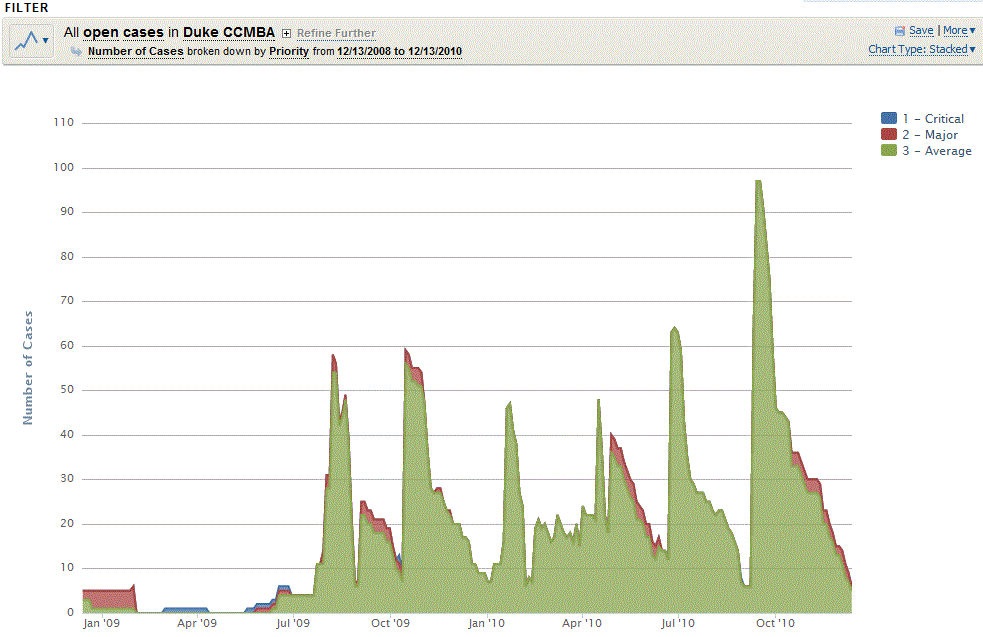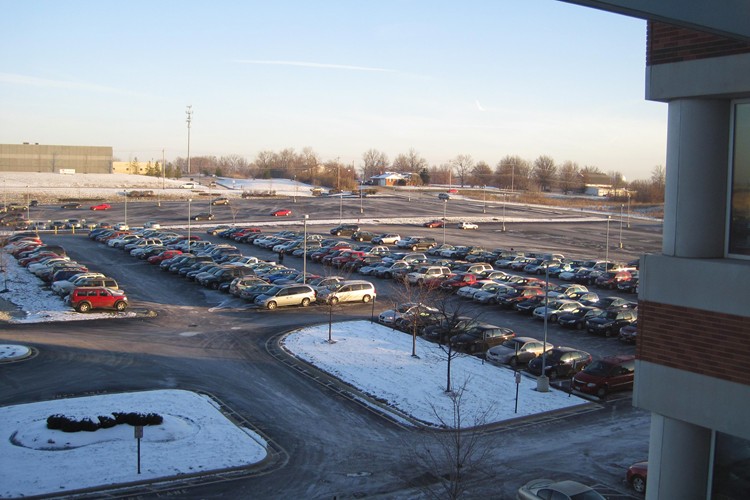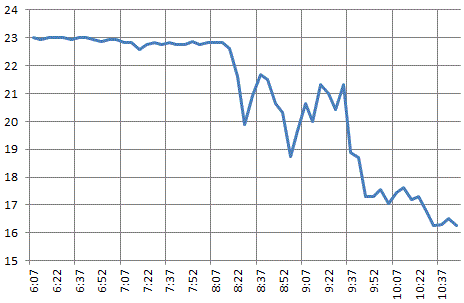I almost forgot: the Inner Drive demonstration site, Weather Now, got a significant upgrade this weekend, to version 3.6. I added two new features that are part of long-term plan of improvements. They don't sound like much, but they're pretty important bits that other features will depend on.
First, the lists of weather stations that appear on the home page are now generated dynamically from a database table. This means that I can change them, remove them, add them, or schedule them without having to make code changes. For example, during NFL Football season, you'll notice a list of home football games that changes every Tuesday at midnight Eastern time. In the past, to add a list like that, I'd have to make code and configuration changes. Now I don't.
Now the cool part, and how this is just a step towards a larger feature: In version 3.7 (coming out in January, I hope), you, dear user, will be able to create your own lists.
Second, I've added caching to the current weather reports. Before, every page view required multiple round-trips to the weather database. Now, any time the site retrieves current weather from the database, it stores the reports for some length of time. Any subsequent page requests will find the weather reports in the cache. This means the home page loads significantly (10x) faster on most views. The site gets about 11,000 page views every day, so this is non-trivial.
The cache right now has a fixed expiration time of 180 seconds, and I can change that through the standard application configuration tools. By "fixed" I mean the cache will discard all reports older than three minutes, forcing the application to refresh those reports from the database. This strikes a good balance between current data and application speed, I think, especially since the National Weather Service (whence comes the data) has new information at about that frequency. (You can read more about how caching works in the Inner Drive Extensible Architecture™ SDK.)
I think these are really cool changes, and I'm excited about how much it moves me down the roadmap. And the 3.7 update will be even cooler.
About five hours ago I finished everything required to earn my MBA. I still have one (option) follow-up lecture for one class, so I can't mark the whole thing "resolved and closed" in FogBugz yet. Thus the precise language: I'm done with all the requirements.
No more Saturday-morning CENTRA sessions. No more papers and exams lurking under the bed. No more residency calendar on my fridge (first attached there 18 months ago).
I feel like Robert Redford's character at the end of The Candidate: "What do we do now?" It's a little freaky.
Total damage, not counting the lecture Thursday and untimed activities like mulling over my assignments while doing something else: 1,437 hours. That's 9 months of full-time work, spread over 18. In other words, between July 2009 and today I spent about 20 hours per week doing something connected with my MBA.

In a wildly-tangential universe, I upgraded FogBugz here at Inner Drive Technology's World Headquarters yesterday. The new version (8.1) produces really cool charts, like this one:

The six big spikes correspond with the residencies that started each term. They drop off quickly because the residencies had immense workloads and short durations. This term, as you can see, had the largest workload of all, because we had four complete classes.
I'm very glad to be done. Parts of me haven't caught up to the reality yet. I'll feel completely through with the program two weeks from Thursday, when I see on the registrar's website that Duke has conferred my degree. Until then, I expect some continuing fogginess.
 After 16 months, 16 classes, six countries (including North Carolina, which still seems a bit foreign), and 1435 hours of work, I'm down to my last assignment. It's a group paper, for which I've already done the bulk of my part, though the team has nominated me to assemble the final draft. It's due at 11 am Monday; expect to see something around then.
After 16 months, 16 classes, six countries (including North Carolina, which still seems a bit foreign), and 1435 hours of work, I'm down to my last assignment. It's a group paper, for which I've already done the bulk of my part, though the team has nominated me to assemble the final draft. It's due at 11 am Monday; expect to see something around then.
This will all make sense to me in a few weeks. Right now a part of my poor brain insists I have something to do that I'm not doing right now...while the rest of it, for the first time since July 2009, knows I really don't have anything hanging over me.
What a weird feeling.
Yesterday, it took me longer to fly home (8½ hours) than it would have taken to drive (6 hours). This almost never happens; and throughout my flight cancellation and delay at Cincinnati's Terminal 2, I remained sanguine and peaceful. (Beer helped.)
Because no matter what flight delays I encountered, no matter what kind of snow blew all over the roads causing the taxi to crawl at a modest walking speed, no matter anything, at least I wasn't in Suburbistan, Ohio:

No, my life wasn't that bad anymore.
This was, I think, my last flight of 2010. And for those keeping score at home: this year I flew in or out of O'Hare 43 times. I'm not sure when I'll do that again, either.
I can't quite grasp that I'll finish my MBA sometime before next Tuesday. My Duke to-do list (I actually use FogBugz for school and for work) has had, over the past two years, 573 items on it. Today I've got just 7 active items, including "Confirm CCMBA degree is conferred" which is due on the 30th.
One paper left. One PowerPoint dreck. Er, deck. One case to read. Two classes.
I have no idea what I'm going to do without all that stress and bother, or with all the time I'll suddenly have. Oh, right: I'll moonlight to pay off my student loans. Forgot that...

I've recently had the opportunity to work on-site with a client who has a strong interest in protecting its customers' privacy. They have understandably strict policies regarding who can see what network data, who can get what access to which applications, etc. And they're interested in the physical security of their buildings.
At some point, however, process can stymie progress, and this client recently added a physical security measure that can stand as a proxy for everything else about how they function. Not content with having a full-time security guard at each lobby entrance, and with doors that require an ID to open, they now have a man-trap-style revolving door system. Only one person can enter the door at a time, or alarms sound. The doors move slowly enough that even the slowest walkers—and this is far Suburbistan, so there are many—can get through without hurrying. And to make extra-special-certain, these doors require a second ID badge.
Now, the client building is 30 km from the nearest city of any size, and that city doesn't even rank in the top 50 by population. In order to get to the building you have to drive some distance from anyplace you'd ever want to be, then cross a parking lot whose area, according to Google Maps, is four times greater than the building's footprint. In other words, they're protecting the building from...nobody. Nobody will ever lay siege to this place.
This aptly demonstrates the philosophy throughout the organization: they have immense barriers that have no purpose except to prevent any actual work from happening. My effort for this particular client lasted several long weeks and produced, in the end, about fifteen lines of code. They brought 60 developers onto the project to speed it up, with the result that 60 developers tripped over procedures and project management at immense cost to the company to produce something four guys in a garage could have done in the same length of time.
There's a punchline, a poignant one for the day after Elizabeth Edwards died: the client is a major health-insurance company.
Do you want to know why the U.S. spends more on health care than any other country? I think I have the answer.
N.B.: The title of this post comes from one of my favorite quotes, usually ascribed to Napoleon Bonaparte but probably coined by Robert Heinlein: "Never attribute to malice that which is adequately explained by stupidity."
Sitting in a cube farm outside Cincinnati, Ohio, I start to wonder...is jail anything like this?

Researchers have documented the soul- and productivity-sucking effects of cubicles for about 20 years, with other related research going back to the 1950s. Someday I will understand why no one acts on this research...
Guys are installing new windows at IDTWHQ, completing the project begun in March 2009. (I split it into two phases to spread the cost over two years.) I ordered this set mid-August. We thought they'd be done in October, but no such luck.
Here's the effect, according to the Inner Drive Technology International Data Center Monitor:

The bottom axis shows local time, the vertical shows degrees Celsius. Also keep in mind that servers produce heat, so the server rack usually runs about 2°C warmer than the rest of the apar—World Headquarters. And for those keeping score at home, right now it's -1°C outside.
I'll have more art later in the day.
Via Schneier, the Department of Homeland Security will soon get rid of color-coded warnings:
In an interview on “The Daily Show” last year, the homeland security chief, Janet Napolitano, said the department was “revisiting the whole issue of color codes and schemes as to whether, you know, these things really communicate anything to the American people any more.”
The answer, apparently, is no.
The Homeland Security Department said the colors would be replaced with a new system — recommendations are still under review — that should provide more clarity and guidance. The change was first reported by The Associated Press.
I wonder what that guy at O'Hare—the one who says "The current threat advisory level is orange" all day—I wonder what he'll do now?
My demo site, Weather Now, has a feature showing weather extremes for the world. Northwest Canada right now is having unusually cold weather. What's the connection? The Calgary Herald published a story about the website yesterday and syndicated it across Canada. Jenna McMurray of the Calgary Sun also picked up the story, and called me for a quick interview.
As a result, Weather Now went from a daily average 4,000 page views up to a server-smashing 337,000 yesterday. It seems traffic has tapered off a bit today, but I'm still getting enormously more hits than usual.
I'm also getting a lot more feedback, like this note from Judy C., who had a Canadian IP address:
Get your facts straight. You and others in your country love to make statements based on minimum research and not double checking what you "think" is correct! Calgary: 2nd coldest place on earth is just as
stupid a comment as other comments on your home page: the world (just the US)! Good grief, no wonder the rest of world laughs at you behind your back.
It took me a few seconds to work out the "just the US" part, but apparently she referred to the link of "coldest places" that filters for just U.S.-based weather reports.
Otherwise, here follows my reply:
Judy,
Thanks for writing.
The site is a programming demo, not a commercial website. As such we only get free information from U.S. government computers. We have no control over the quality or quantity of information that foreign governments make available to the U.S. National Oceanic and Atmospheric Administration, nor do we have any control over what NOAA makes available to us.
The difficulty our site faces is that Environment Canada and similar agencies in other Commonweath nations retain Crown copyright over most of the data that we would want on our site. EC only makes data available for about 100 stations in Canada. So even though it got down to -35C in parts of Alberta Monday night, the only stations we had available in the affected region were two near Calgary, which only got to -30C. As it turns out, northern Alberta briefly got colder (-39C) than Antarctica (-38C), and was, as far as anyone knows, the coldest place on earth.
The site automatically produces the lists of hottest and coldest places every 20 mintues without human intervention. All these facts conspire to produce some odd results from time to time, particularly during severe weather events such as the one Canada is experiencing in Alberta, Saskatchewan, and the Northwest Territories right now.
As for the rest, I assure you the world laughs at us to our faces, not behind out backs. We have a reputation for being rude, thoughtless, and belligerent that other people--for example, Canadians--do not. It occasionally makes polite discourse difficult, as people sometimes assume the worst motivations on the basis of the most banal facts.
Thank you again for your note.
She thanked me for my considered reply. Aww.